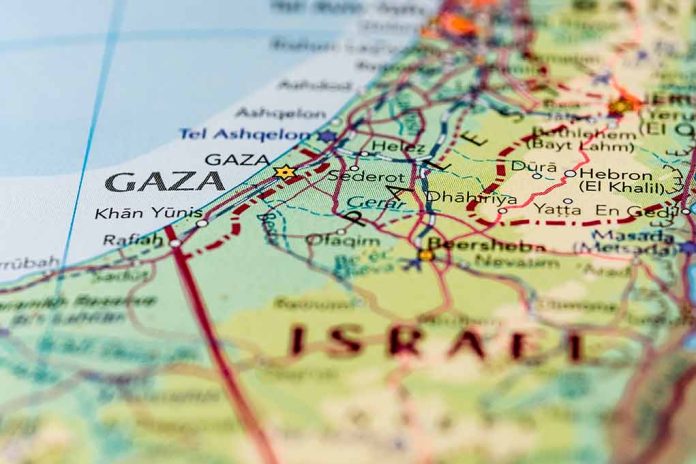
Donald Trump’s proposal to dominate the Gaza Strip and relocate Palestinians provokes global controversy and legal challenges.
Key Takeaways
- Trump’s Gaza proposal sparks global diplomatic outrage.
- International condemnation highlights legal and ethical concerns.
- Regional and global powers emphasize a two-state solution.
- Trump’s plan faces significant legal challenges under international law.
- There are contradictory responses from Democrats and Republicans in the U.S.
Global Diplomatic Shockwaves
Donald Trump’s proposal to “take over” the Gaza Strip has caused significant uproar among international powers and regional players. Depicting it as the future “Riviera of the Middle East,” this plan has been met with widespread condemnation. Palestinian civilians and Palestinian Authority President Mahmoud Abbas denounce it as a breach of international law.
Notably, Abbas asserted, “These calls represent a serious violation of international law, and peace and stability in the region will not be achieved without the establishment of a Palestinian state with Jerusalem as its capital.”
Regional powers, including Egypt, Jordan, and Saudi Arabia, are joined by international actors like France, the U.K., Russia, and China in opposing the proposal. These countries emphasize the need for a two-state solution as the only viable path to peace. Despite the global rejection, President Trump maintains the stance that relocating the nearly two million Palestinians currently residing in Gaza would lead to a brighter future for them.
"In this video, we take a deep dive into Donald Trump’s controversial proposal to relocate Palestinians from Gaza to neighboring countries like Egypt and Jordan.Why is this idea sparking outrage?What are the political,legal, and humanitarian implications?"https://t.co/QzGPKHi8W7
— Gudrun Assmann (@GudrunAssmann) January 29, 2025
Legal Challenges and International Law
Trump’s plan faces mounting legal challenges. Gaza is considered an occupied territory under the jurisdiction of the International Court of Justice. Any occupation without Palestinian consent is deemed illegal, violating Article 49 of the Geneva Conventions which prohibits forcible transfer. The proposal’s lack of legal grounding and execution specifics compounds these challenges, earning further scrutiny from legal experts.
The controversial rhetoric around forcibly relocating Palestinians raises alarms about potential ethnic cleansing. Such forceful actions starkly contravene international humanitarian law. Democrats in the U.S. have criticized the plan, labeling it destabilizing for Middle East peace prospects. In contrast, Republicans largely endorse the proposal as a peace initiative, although dissent exists within the party.
US President Donald Trump has recently reiterated his proposal to relocate Palestinians from Gaza to Egypt and Jordan, despite strong opposition from those countries and various international entities. Trump's plan involves moving Gazans out of the conflict-ridden area, which he…
— Clarence Terrell (@clarenceTerre) January 31, 2025
Viability and Perception Among Israelis
While Trump’s proposal has spurred debate, its viability remains in question. Some Israeli observers view Trump’s statements as a strategic affront rather than a practical plan. A poll indicates substantial support for relocating Gazans among Israelis, while most Arab citizens within Israel oppose it. The contradictory nature of Trump’s comments compared to his other Middle East policies, such as maintaining the Gaza ceasefire, complicates perceptions and fuels further discussion.
“We want to remind Trump and Netanyahu that human lives are at stake, and we need to return them as a top priority, and only after that if we want to make changes,” said Ronen Neutra, the father of Israeli soldier Omer Neutra, who was killed in Hamas’ Oct. 7, 2023 terrorist attack.
This discourse opens a broader conversation about the appropriateness of discussing territory and population relocations so nonchalantly. The ongoing dialogues reflect deep-seated tension over what constitutes legitimate policy and how such proposals align with long-term peace objectives for the region.


